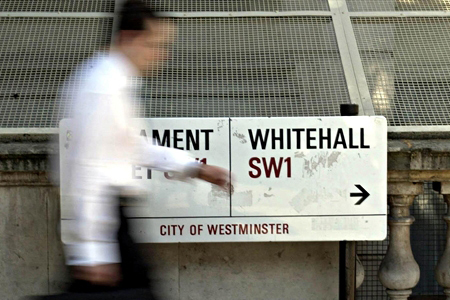Gov denies Verify could be used to spy on you
GDS issues rebuttal to paper claiming identity assurance scheme degrades your privacy

The government has denied its new identity assurance service, Gov.uk Verify, could lead to mass surveillance of citizens, following claims made by a group of academics.
Verify reduces the privacy of citizens due to technical flaws in the system's architecture, wrote the three authors of a paper titled Toward Mending Two Nation-Scale Brokered Identification Systems.
The Government Digital Service (GDS) designed Verify as a way for people to prove they are who they say they are when using government services online, and HMRC is already using it with allegedly mixed success.
Verify relies on a central hub to mediate interactions between the departments providing a service, companies performing the identity checks and the citizens using Verify.
Users of Verify are passed to identity authentication providers, who ask questions and use official documentation to confirm citizens' IDs, the idea being to limit the amount of information the government or the providers have on people.
But the authors of the research, Lus Brando, Nicolas Christin, and George Danezis warned too much trust has been placed in the hub, through which all the information travels, as it has the power to read encrypted information coming from identity checks and users themselves.
"The excessive trust placed on the hub could be notably used to support undetected mass surveillance," the report read.
Get the ITPro daily newsletter
Sign up today and you will receive a free copy of our Future Focus 2025 report - the leading guidance on AI, cybersecurity and other IT challenges as per 700+ senior executives
"Leaving the hub outside of the scope of privacy and security goals triggers serious problems. As currently inferred, [Gov.uk Verify] may actually degrade the privacy of citizens."
However, the GDS published a blog post this morning denying Verify could be used to spy on people.
It read: "Gov.uk Verify does not allow for mass surveillance. It does not have any other connection with or ability to monitor people or their data.
"Only minimal data passes through the Gov.uk Verify hub. The person's name, address and date of birth [and gender] is sent through the hub to a government department the person is trying to access.
"No data about the person's interactions or activities within certified companies or government departments passes through the hub."
But the GDS did say the report's findings added to the pool of knowledge around digital identity assurance issues, and has welcomed Danezis as a member of the government's privacy and consumer advisory group.
Verify's use by HMRC came under scrutiny this month after thousands were understood to have missed out on a marriage tax break because they were asked to provide documents many people did not actually have.
In response, HMRC is introducing an alternative process for those who have been unable to use Verify to apply for the tax break.
-
 Google faces 'first of its kind' class action for search ads overcharging in UK
Google faces 'first of its kind' class action for search ads overcharging in UKNews Google faces a "first of its kind" £5 billion lawsuit in the UK over accusations it has a monopoly in digital advertising that allows it to overcharge customers.
By Nicole Kobie
-
 Neural interfaces promise to make all tech accessible – it’s not that simple
Neural interfaces promise to make all tech accessible – it’s not that simpleColumn Better consideration of ethics and practical implementation are needed if disabled people are to benefit from neural interfaces
By John Loeppky
-
 The UK cybersecurity sector is worth over £13 billion, but experts say there’s huge untapped potential if it can overcome these hurdles
The UK cybersecurity sector is worth over £13 billion, but experts say there’s huge untapped potential if it can overcome these hurdlesAnalysis A new report released by the DSIT revealed the UK’s cybersecurity sector generated £13.2 billion over the last year
By Solomon Klappholz
-
 UK businesses patchy at complying with data privacy rules
UK businesses patchy at complying with data privacy rulesNews Companies need clear and well-defined data privacy strategies
By Emma Woollacott
-
 Data privacy professionals are severely underfunded – and it’s only going to get worse
Data privacy professionals are severely underfunded – and it’s only going to get worseNews European data privacy professionals say they're short of cash, short of skilled staff, and stressed
By Emma Woollacott
-
 "Thinly spread": Questions raised over UK government’s latest cyber funding scheme
"Thinly spread": Questions raised over UK government’s latest cyber funding schemeThe funding will go towards bolstering cyber skills, though some industry experts have questioned the size of the price tag
By George Fitzmaurice
-
 Four years on, how's UK GDPR holding up?
Four years on, how's UK GDPR holding up?News While some SMBs are struggling, most have stepped up to the mark in terms of data governance policies
By Emma Woollacott
-
 Multicloud data protection and recovery
Multicloud data protection and recoverywhitepaper Data is the lifeblood of every modern business, but what happens when your data is gone?
By ITPro
-
 Intelligent data security and management
Intelligent data security and managementwhitepaper What will you do when ransomware hits you?
By ITPro
-
 How to extend zero trust to your cloud workloads
How to extend zero trust to your cloud workloadsWhitepaper Implement zero trust-based security across your entire ecosystem
By ITPro